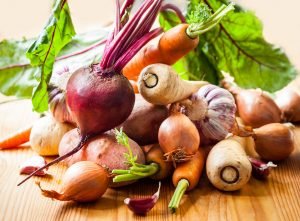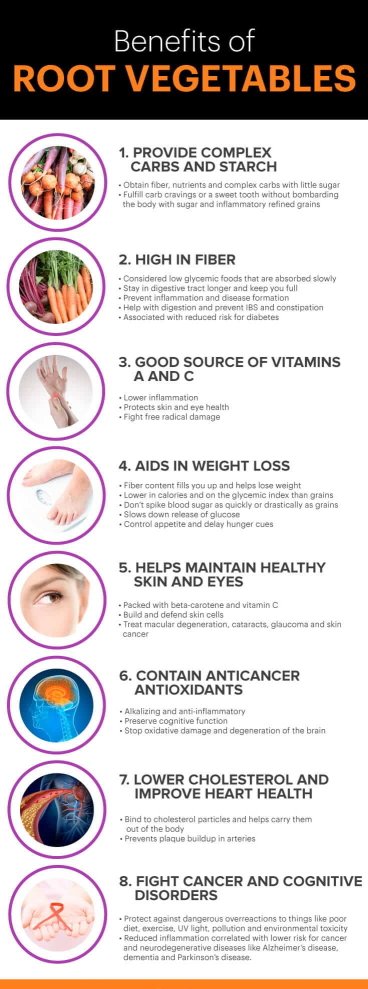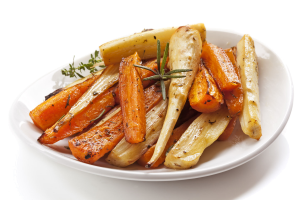 Eat local is a mantra we tend to hear all the time these days. It is an important goal, but it can also be challenging to do in northern New England in the dead of winter. Enter, the root vegetable. Root vegetables include any part of a plant that grows under the soil. Some are obvious, like sweet potatoes and beet but ginger, for example, is considered a root vegetable.
Eat local is a mantra we tend to hear all the time these days. It is an important goal, but it can also be challenging to do in northern New England in the dead of winter. Enter, the root vegetable. Root vegetables include any part of a plant that grows under the soil. Some are obvious, like sweet potatoes and beet but ginger, for example, is considered a root vegetable.
They tend to be a central focus for holiday meals because these wonderful packets of nutrients and goodness were generally what was still available from the annual harvest for our ancestors in November and December. But for the rest of the year, being out of sight can mean they are also out of mind.
In the old days, root vegetables were easy to store in root cellars. Many of us don’t have root cellars now, but you can easily store root veggies in a cool garage or basement if you harvest, cure and pack them carefully. Just keep a good eye on them so that one spoiling root doesn’t ruin the whole lot.
Another reason that root veggies have been neglected is because of all the bad press that has been focused on carbs from certain diet zealots. There is one thing we need to learn about nutrition: stop thinking in generalities and become more discerning.
All carbs are not “bad.” It’s the refined carbs and sugar that we need to stay away from. Stick with the slow carbs which means whole foods that are full of fiber. Along with lots of healthy fiber, roots are high in carbohydrates and are more like grains than greens. Thus, they are more like whole grain breads, rice, or pasta.
4 Reasons to Eat Root Veggies
- These veggies are super-nutritious because the plant stores extra nutrients to help it get through harsh weather such as winter and drought. The result is concentrated nutrients in the root.
- Root veggies in general are a great source of B vitamins and minerals such as potassium, manganese, and magnesium. Some roots are a good source of vitamin A and calcium.
- A rich source of fiber, particularly resistant starch, these veggies are good for your digestion and overall health, including your microbiome, blood sugar management, and feelings of satiety.
- They are relatively low in calories and quite high in antioxidants helping them to fight inflammation.
… and more.

4 Reasons to Watch Your Portion
- Root vegetables are also considered starches, a kind of carbohydrate that breaks down into sugar.
- If you eat more carbs than your body needs, it will store them as fat which leads to weight gain.
- Eating too many carbs in one sitting can spike your blood sugar which over time can put you at risk for diabetes and can also make it more difficult to manage if you already have diabetes.
- Traditionally, root veggies are prepared with quite a bit of extra fat such as mashed potatoes loaded with butter or a baked potato with sour cream and bacon bits. Or they can even be deep fried like the all-time American favorite, French fries.
Making the Choice Healthier.
Root veggies are a great choice in a healthy balanced diet. Because they are whole foods, they offer a variety of vitamins, minerals, antioxidants, and flavonoids which are all anti-inflammatory. The more deeply colored they are, the better they are for you. Think beets, sweet potatoes, carrots, deeply colored potatoes.
When you plan your meals, consider them as a starch serving. They make a great substitution for white potatoes. One serving a day is a smart goal making sure it is a side dish or part of another dish. You want to avoid combining a root vegetable with another starch, such as sweet potato and rice.
Get creative with the cooking process. You can make root veggies taste great in several different ways that skip excess calories. Here are some ideas:
- Roast them to bring out their natural sweetness and to develop a crispy brown exterior.
- Braise them. Root vegetables become tender and deeply flavored when cooked slowly in a bit of liquid.
- Try root vegetable fries. Just make sure you bake them and use just a little oil. My favorite is parsnip fries.
- Add them to soups and stews for flavor, nutrients, and substance.
- Make a vegetable hash by either shredding or dicing root veggies.
- Or, follow the new trend in cooking root vegetables. The secret is using less common cooking methods (such as braising, barbecuing, or searing) and then pairing the vegetables with interesting flavors. Consider barbecued carrots with daikon radish and pomegranate dressing, carrot tahini dip, roasted sweet potatoes and caramelized onions with cilantro dressing, or miso-glazed turnips.
Check out some of my recipes HERE.

